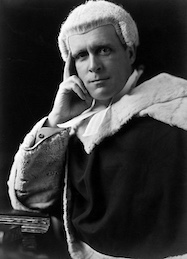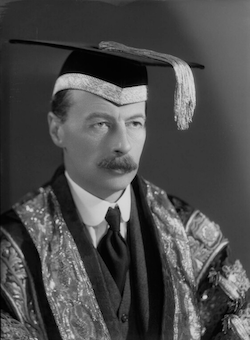Abolition of the UK Grand Jury in 1933
Six Lords spoke in the debate all in favour of abolition.
Lord Atkin (no party) acknowledged a time when the grand jury was a real constitutional safeguard ... "in prosecutions for political offences - but possibly those days may now assumed to be over." He thought the right to trial by jury should also remain for cases of wrongful dismissal and insurance claims.
Lord Snell (Fabian) heartily supported the Bill if the right to trial by jury included cases of fraud.
Lord Darling (Con) thought Grand Juries were not worth the trouble and expense to provide grand jurors with a 'university education'.
Lord Hanworth (Con) considered the proposals to remove the right to trial by jury was just a change of emphasis.

Viscount Sankey (1866-1948)
Lawyer, judge and politician he gave his name to the
1940 Sankey Declaration of the Rights of Man.
He was behind the 'living tree doctrine'
entrenched in Canadian constitutional law.
Sir Stafford Cripps MP (Lab) declared it "refreshing to see the Conservative Party pulling down the so-called ancient safeguards of the Constitution" and described the Grand Jury as an archaic procedure which had ceased to have any reality in the modern day.
Sir Walter Greaves-Lord MP (Con) thought Grand Jury secrecy was bad for those later acquitted. He reported that it was the Bar Council who had demanded that the right to trial by jury be passed in legislation and that members were opposed to the changes.
Edward Cavendish, Marquess of Hartington MP (Con) was the only person to speak against abolition. Whilst there might be an overwhelming case to abolish Grand Juries in great cities they might still fulfil a very useful function in other places and should be retained where no heavy expenditure was required. If a fascist government created new offences such as holding views disrespectful of the government, then the Grand Jury might be a very constitutional safeguard of immense value. The Grand Jury had been of value in the past and "it is well within the realm of possibility that it might be of great value in the future."

Edward Cavendish MP
Marquess of Hartington (1895-1950)
He had careers with the army and in politics and was
Masonic Grand Master of the United Grand Lodge of England.
He died suddenly of an apparent heart attack in the
presence of the suspected serial killer John Adams GP.
Letter to The TIMES, 13th July 1933
Ever since 1681, when the Ignoramus (*) of a grand jury saved Lord Shaftesbury from a trial for treason, it is clear that the grand jury is capable of being a real safeguard for the liberties of the subject.
These liberties need safeguards even more today that they did in 1681, because the bureaucrats of Whitehall who dominate the Cabinet which in turn dominates the House of Commons, have established a more effectual and a more oppressive tyranny than the Stuarts ever succeeded in establishing. We cannot in these days afford to lose one of our few remaining securities for freedom of speech and action.
Professor W. S. Holdsworth,
(*) meaning 'we do not know' i.e. 'we know of no reason why he should stand trial'
The Bill passed the House of Commons on 18th July 1933.
The last Grand Jury met at the London Sessions on 29th August 1933 and on 1st September the Grand Jury in England and Wales was abolished.